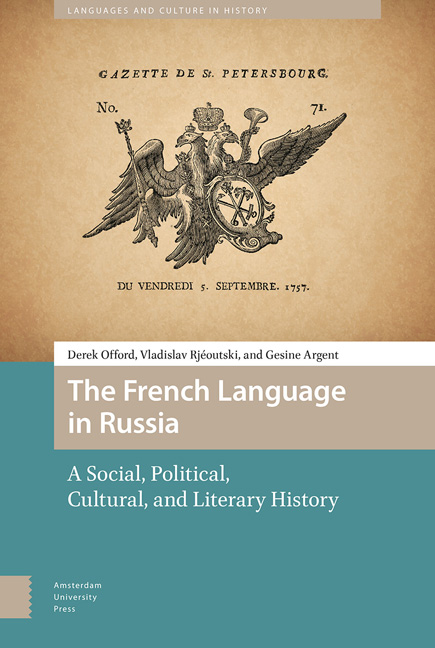Book contents
- Frontmatter
- Contents
- List of illustrations
- Preface
- Acknowledgements
- Presentation of Dates, Transliteration, and other Editorial Practices
- The Romanovs
- Introduction
- Chapter 1 The historical contexts of Russian francophonie
- Chapter 2 Teaching and learning French
- Chapter 3 French at court
- Chapter 4 French in high society
- Chapter 5 French in diplomacy and other official domains
- Chapter 6 Writing French
- Chapter 7 French for cultural propaganda and political polemics
- Chapter 8 Language attitudes
- Chapter 9 Perceptions of bilingualism in the classical Russian novel
- Conclusion The functions of French in imperial Russia
- Bibliography
- Index
- Languages and Culture in History
Introduction
Published online by Cambridge University Press: 16 February 2021
- Frontmatter
- Contents
- List of illustrations
- Preface
- Acknowledgements
- Presentation of Dates, Transliteration, and other Editorial Practices
- The Romanovs
- Introduction
- Chapter 1 The historical contexts of Russian francophonie
- Chapter 2 Teaching and learning French
- Chapter 3 French at court
- Chapter 4 French in high society
- Chapter 5 French in diplomacy and other official domains
- Chapter 6 Writing French
- Chapter 7 French for cultural propaganda and political polemics
- Chapter 8 Language attitudes
- Chapter 9 Perceptions of bilingualism in the classical Russian novel
- Conclusion The functions of French in imperial Russia
- Bibliography
- Index
- Languages and Culture in History
Summary
Conventional assumptions about Franco-Russian bilingualism
Until recently, the role of the French language in Russia had attracted rather little attention, save for passing remarks in works on Russian social or cultural history. No doubt this oversight is due partly to the fact that social and cultural historians and western students of the Russian nobility, on the whole, have not been specialists in linguistic matters and partly also to the fact that historical sociolinguistics is a relatively new academic discipline. In those works of scholarship (especially Anglophone scholarship) in which Franco-Russian bilingualism has been mentioned, moreover, we find a number of generalizations which have tended to reinforce the predominantly negative discourse on the subject in classical Russian thought and literature. Since we shall want to probe the accuracy of these generalizations in the course of our account of language use and language debate in eighteenth- and nineteenth-century Russia, we begin by briefly considering three of them. In the process, we shall introduce some of the key questions that our discussion of language use and language attitudes will need to explore and some of the larger narratives about Russian culture within which that discussion needs to be situated. We shall also rehearse some of the arguments against the commonplaces that are encountered.
First, the Russian nobility (which was numerically very small as a proportion of the population of the empire) is commonly treated as a clearly defined and undifferentiated class which uniformly adopted French in preference to Russian. The impression may even be given that all nobles, over a long period, spoke French all the time, and in all situations, to any compatriots who could understand that language. Thus it is claimed – to take an extreme example – that ‘for over two hundred years French (and, to a smaller extent, English) replaced Russian as the principal language spoken by the vast majority of Russian aristocracy, landed gentry, government officials, army officers, and wealthy merchants’. Even a leading sociolinguist, whose authoritative work we frequently cite, is drawn into a large generalization covering a vague time-span: ‘In some countries it is expected that educated persons will have knowledge of another language. This is probably true for most of the European countries, and was even more dramatically so earlier in countries like pre-Revolution Russia, where French was the language of polite, cultured individuals’.
- Type
- Chapter
- Information
- The French Language in RussiaA Social, Political, Cultural, and Literary History, pp. 35 - 78Publisher: Amsterdam University PressPrint publication year: 2018



